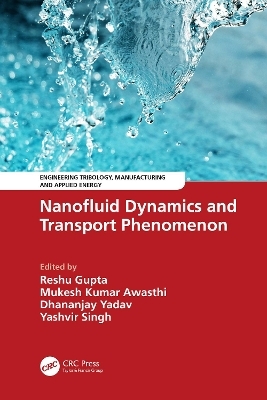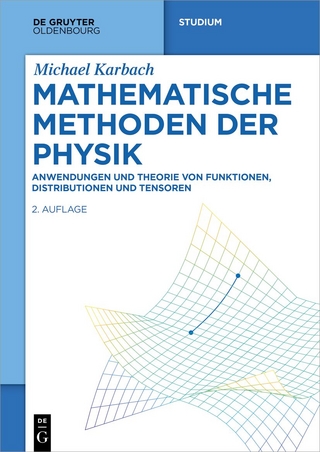
Nanofluid Dynamics and Transport Phenomenon
CRC Press (Verlag)
978-1-032-86375-7 (ISBN)
- Lieferbar (Termin unbekannt)
- Versandkostenfrei innerhalb Deutschlands
- Auch auf Rechnung
- Verfügbarkeit in der Filiale vor Ort prüfen
- Artikel merken
The text offers a detailed presentation of mathematical, numerical, and experimental techniques for nanofluids. It further covers the synthesis, characterization, stability, and heat transport. The book comprehensively discusses topics such as the comparison of heat transfer models, flow features of ternary hybrid nanofluids, thermodynamics and mass diffusion, and natural convection in triangular cavities.
This book:
Emphasizes the enhancement of heat transfer processes through nanoparticles, extending beyond heat transfer to applications in renewable energy.
Explores the applications of nanofluids in enhancing food processing and agricultural practices.
Covers thermal instability of couple-stress on viscous-elastic nanofluid flow and natural convection in a triangular cavity.
Explains concepts including nanofluid-based energy storage, mass diffusion, thermodynamics, and nanofluid synthetic techniques.
Presents topics such as numerical methods, fluid dynamics simulation, magnetohydrodynamics, heat and mass transfer, and radiation.
It is primarily written for senior undergraduates, graduate students, and academic researchers in the fields of mechanical engineering, aerospace engineering, automotive engineering, industrial and production engineering, energy engineering, fluid dynamics, and tribology.
Reshu Gupta has done her Ph.D. on the topic “Study of some problems of Heat Transfer in the Flows of some Fluids” from C.C.S. University, Meerut. She is an Assistant Professor in the Applied Science Cluster (Mathematics) at the UPES, Dehradun India. She has 20 years’ experience of teaching. She is a dedicated, resourceful, and goal-driven professional educator with a solid commitment to the social and academic growth and development of every student. She is a caring faculty member who wants all students to be successful learners and works to create a classroom atmosphere that is stimulating, encouraging, and adaptive to the varied needs of students. Her research area includes fluid dynamics, differential equations, heat, and mass transfer, Nanofluids, entropy, and artificial neural networks. She published several papers in SCI/Scopus journals and conference proceedings. Dr. Gupta introduces concepts into the curriculum related to life and social skills. Her teaching philosophy is grounded in the understanding that it is her responsibility to create an environment that supports and inspires student learning. She believes that the most significant learning occurs in situations that are both meaningful and realistic. Her general teaching focus at university is to promote learning by engaging students in their learning environment, promoting higher-order thinking skills, and respecting their opinions and backgrounds. She has taught Linear Algebra, Numerical Methods, Differential Equations, Calculus, Abstract Algebra, Ring Theory, Discrete Mathematics, Engineering Mathematics, Fourier series, Laplace Transform. Mukesh Kumar Awasthi has done his Ph.D. on the topic “Viscous Correction for the Potential Flow Analysis of Capillary and Kelvin-Helmholtz instability”. He is working as an Assistant Professor in the Department of Mathematics at Babasaheb Bhimrao Ambedkar University, Lucknow. Dr. Awasthi is specialized in the mathematical modeling of flow problems. He has taught courses of Fluid Mechanics, Discrete Mathematics, Partial differential equations, Abstract Algebra, Mathematical Methods, and Measure theory to postgraduate students. He has acquired excellent knowledge in the mathematical modeling of flow problems and he can solve these problems analytically as well as numerically. He has a good grasp of the subjects like viscous potential flow, electro-hydrodynamics, magneto-hydrodynamics, heat, and mass transfer. He has excellent communication skills and leadership qualities. He is self-motivated and responds to suggestions in a more convincing manner.Dr. Awasthi has qualified National Eligibility Test (NET) conducted on all India level in the year 2008 by the Council of Scientific and Industrial Research (CSIR) and got Junior Research Fellowship (JRF) and Senior Research Fellowship (SRF) for doing research. He has published 115 plus research publications (journal articles/books/book chapters/conference articles) in Elsevier, Taylor & Francis, Springer, Emerald, World Scientific, and many other national and international journals and conferences. Also, he has published 8 books. He has attended many symposia, workshops, and conferences in mathematics as well as fluid mechanics. He has got the “Research Awards” consecutively four times from 2013-2016 by the University of Petroleum and Energy Studies, Dehradun, India. He has also received the start-up research fund for his project “Nonlinear study of the interface in multilayer fluid system” from UGC, New Delhi. He is also listed in the top 2% influential researchers in the World prepared by Stanford University based on Scopus data in 2022. His Orcid is 0000-0002-6706-5226, Google Scholar web link is https://scholar.google.co.in/citations?user=Dj3ktGAAAAAJand research gate web link ishttps://www.researchgate.net/profile/Mukesh-Awasthi-2. Dhananjay Yadav received his Ph.D. degree from Department of Mathematics, Indian Institute of Technology (IIT) Roorkee, India in 2013 and post-graduation (M.Sc.) in Mathematics from DDU University Gorakhpur, India in 2007. Currently, he is working as an Associate Professor in Department of Mathematics at University of Nizwa, Oman. Prior to his appointment to University of Nizwa, Oman, he had worked as Principal Research Scientist at Athabasca University, Canada, Yonsei University, South Korea and Jeju National University, South Korea. He is a leading expert in CO 2 capture, storage and oil recovery, Computational sustainability and environmental analytics, Fluid mechanics, Numerical analysis, Hydrodynamic and Hydromagnetic stability, Nanofluids and Fluid flow in porous media. He has published more than 100 research articles (high impact factor) in various reputed international journals. He is also listed in the top 2% influential researchers in the World prepared by Stanford University based on Scopus data. Yashvir Singh is presently working as an Associate Professor at Mechanical Engineering Department of Harcourt Butler Technical University, Kanpur, Uttar Pradesh, India. He has completed his Ph.D. in the area of tribology from the University of Petroleum and Energy Studies, Dehradun, Uttarakhand, India, and his Master of Technology from Dr. APJ Abdul Kalam Technical University, Lucknow, Uttar Pradesh, India. He has a rich experience of more than 14 years as an academician and researcher in various Universities and Colleges. He has published more than 100 research papers in SCI/Scopus/Web of Science Journals with high impact factors. He has attended 37 Conferences in India and 4 International Conferences. He has written 3 books with International Publishers – CRC Press, Nova Publishers. He is a reviewer and editorial board member of various reputed International Journals in Elsevier, Springer, Bentham Science, Taylor and Francis. He is an active member in organizing many international seminars, workshops, and conferences in India, Taiwan, Malaysia. Dr. Singh has guided various Students and presently working in Joint collaboration with Various Countries Professors and Scientists. He is also listed in the top 2% influential researchers in the World prepared by Stanford University based on Scopus data in 2022.
1. Nanofluid Dynamics Properties and Applications. 2. Experimental Techniques for Nano-fluid Testing and Validation. 3. The Application of Nanofluids in Thermal Management Systems. 4. Optimizing SAH Performance: A Computational Approach with Nanofluid Integration. 5. Carbon nanotubes for evacuated Tube Solar Collector. 6. Optimization algorithm for CNT application in solar system. 7. Enhancement of Casson SWCNT-MWCNT- Graphene/ethanol tri-hybrid nanofluid’s heat transfer over a spinning disk. 8. Adoption, Development and Application of Robotic & Nanofluid Technology in Sustainable Healthcare: A Comprehensive Study. 9. MHD Darcy-Forchheimer ternary Ag-Au-Cu/H2O hybrid nanofluid flow over moving thin needle under the influence of Hall current and chemical reaction. 10. Natural Convection in a Triangular Cavity Filled with MoS_2-waterNanofluid and Microorganisms – Finite Element Method. 11. Activation Energy and Inclined Magnetization on Convective Transportation of Casson Nanofluid with Thermal Radiation. 12. Numerical computation of bioconvection flow in nanofluid over stretching sheet in non-Darcy medium with Forchheimer correction. 13. Nanofluidic Applications in Sustainable Food Technology and Agriculture.
| Erscheinungsdatum | 02.11.2024 |
|---|---|
| Reihe/Serie | Engineering Tribology, Manufacturing and Applied Energy |
| Zusatzinfo | 21 Tables, black and white; 81 Line drawings, black and white; 7 Halftones, black and white; 88 Illustrations, black and white |
| Verlagsort | London |
| Sprache | englisch |
| Maße | 156 x 234 mm |
| Gewicht | 650 g |
| Themenwelt | Mathematik / Informatik ► Mathematik ► Angewandte Mathematik |
| Naturwissenschaften ► Physik / Astronomie ► Strömungsmechanik | |
| Technik ► Maschinenbau | |
| Technik ► Umwelttechnik / Biotechnologie | |
| ISBN-10 | 1-032-86375-7 / 1032863757 |
| ISBN-13 | 978-1-032-86375-7 / 9781032863757 |
| Zustand | Neuware |
| Haben Sie eine Frage zum Produkt? |
aus dem Bereich


